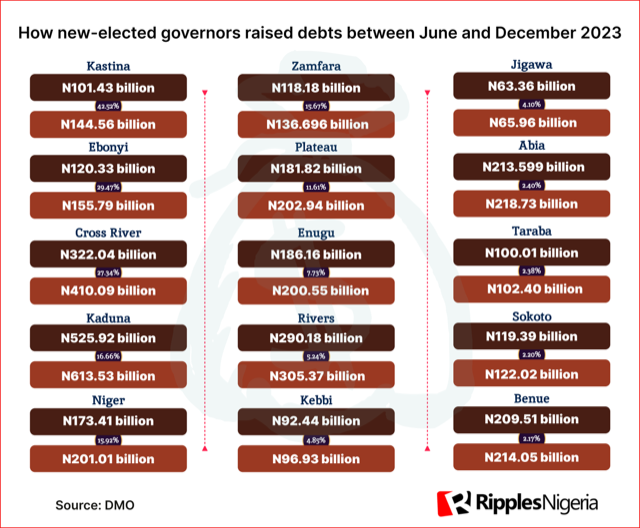Ripples Metrics
RipplesMetrics: How newly-elected governors raised states’ debts in 7 months

As of December 2023, Nigeria, including the 36 states and the federal capital territory, had a public debt of N97.34 trillion. The debt has increased from N87.91 trillion reported just three months before, in September 2023.
The data from the Debt Management Office showed that the total public debt rose by N9,43 trillion within three months. Over the first half of the year, Nigeria’s debt rose from N49.85 trillion in the first quarter of 2023 to N87.38 trillion record in the second quarter.
The increases were tied to the reported misappropriation of Ways and Means fund collected by the former president, Muhammadu Buhari, to N22.71 trillion, which according to the Central Bank of Nigeria and National Assembly, has generated interest over time.
With the recent debt figure, the federal government has a domestic debt of N53.26 trillion, while the subnational states have a domestic debt of N5.86 trillion. Also, the external debts of the federal government stood at $37.89 billion while the subnational state external debt stood at $4.61 billion.
This would make a total domestic debt of N59.12 trillion and an external debt of $42.50 billion for the country. Ripples Nigeria reported how a leading global business intelligence and market insight provider, Economist Intelligence Unit, said that the CBN does not have the liquidity to support the naira in its Country’s Report on Nigeria.
States debt profile
On May 29, 17 new governors were sworn in, assuming offices after they had successfully won their respective gubernatorial elections in March 2023. For this report, RippleMetrics looked into some selected states’ debt profiles between June 2023 and December 2023, detailing how the governors who assumed office raised the states’ debt in seven months.
READ ALSO:RipplesMetrics: Nigeria pulls N8.54 trillion as taxes from VAT, CIT in 2023
Findings from the data showed that within the seven months under review, 15 out of 17 states increased their debt profile. These states are Kastina, Niger, Zamfara, Plateau, Cross River, Rivers, Ebonyi, Kebbi, Benue, Jigawa, Enugu, Taraba, Kaduna, Sokoto, and Abia states.
The highest increase was Kastina state raising its debt from N101.43 billion in June 2023 to N144.56 billion as of December, an increase of 42.52 per cent. It was followed by Ebonyi and Cross River, with 29.47 per cent and 27.34 per cent increases within the seven months respectively.
In June, Ebonyi and Cross River had a debt profile of N120.33 billion and N322.04 billion respectively, but it increased to N155.79 billion and N410.09 billion respectively in December 2023.
Also within the months under review, Kaduna State increased its debt by 16.66 per cent from N525.92 billion to N613.53 billion; Niger by 15.92 per cent from N173.41 billion to N201.01 billion and Zamfara State by 15.67 per cent from N118.18 billion to N136.696 billion.
For Plateau State, the debt rose from N181.82 billion to N202.94 billion, an increase of 11.61 per cent. Also, within seven months, Enugu, Rivers, Kebbi and Jigawa increased their debts by 7.73 per cent, 5.24 per cent, 4.85 per cent and 4.10 per cent respectively.
This means Enugu’s debt increased from N186.16 billion to N200.55 billion; Rivers State from N290.18 billion to N305.37 billion; Kebbi State from N92.44 billion to N96.93 billion and Jigawa State from N63.36 billion to N65.96 billion.
Meanwhile, the lowest debt increase, with a rise of about two per cent, was reported in Abia (2.40 per cent), Taraba (2.38 per cent), Sokoto (2.20 per cent) and Benue (2.17 per cent).
By this, Abia’s debt increased from N213.599 billion to N218.73 billion; Taraba state’s from N100.01 billion to N102.40 billion; Sokoto state’s from N119.39 billion to N122.02 billion and Benue state’s from N209.51 billion to N214.05 billion.
However, RipplesMetrics analysis showed that only two states decreased their debt within seven months. These states are Delta and Akwa Ibom. Delta reduced its debt by 16.54 per cent from N511.27 billion to N426.72 billion while Akwa Ibom reduced its debt by 1.86 per cent from N233.13 billion to N228.80 billion.
By: James Odunayo
Join the conversation
Support Ripples Nigeria, hold up solutions journalism
Balanced, fearless journalism driven by data comes at huge financial costs.
As a media platform, we hold leadership accountable and will not trade the right to press freedom and free speech for a piece of cake.
If you like what we do, and are ready to uphold solutions journalism, kindly donate to the Ripples Nigeria cause.
Your support would help to ensure that citizens and institutions continue to have free access to credible and reliable information for societal development.

























